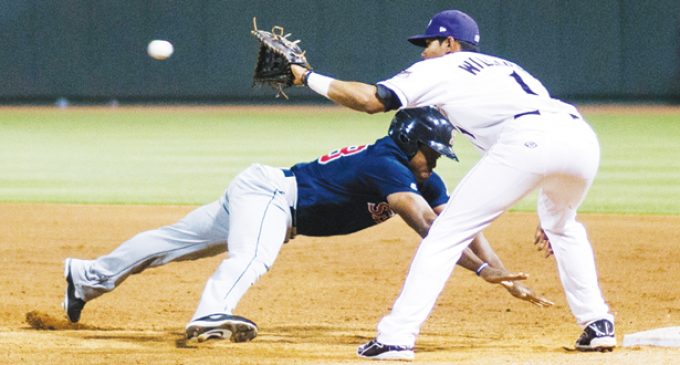Family’s baseball roots run deep for Dash’s T.J. Williams

In photo above: Winston-Salem Dash first baseman, Tyler “T.J.” Williams, right, completes the double-play as he tags “out” Salem Red Sox’s Franklin Guzman on Friday, May 15, at BB&T Ballpark in downtown Winston-Salem. (Photo by Erin Mizelle for the Winston-Salem Chronicle)
For the most part, minor-league baseball players live a transient kind of lifestyle. That’s because the primary goal is to play well enough during the course of the season to be promoted to a higher level of play.
As a result, players in the minors remain in a state of readiness to move at a moment’s notice. It’s all part of the process of moving up through the farm system until the ultimate goal is reached – getting the call to play for a Major League team.
Case in point: T.J. Williams. The 24-year-old infielder started the season with the Kannapolis Intimidators (lower Class-A). Five weeks into the season, however, Williams was called up to play for the Winston-Salem Dash (high Class-A) in mid-May.
Even before turning pro out of Pima Community College (Ariz.), Williams already had firsthand knowledge about the life of a pro athlete. His father, Ken Williams, played six seasons in the Major Leagues (Chicago White Sox, Detroit Tigers, Montreal Expos and Toronto Blue Jays). Today, the elder Williams is an executive vice-president of the White Sox.
Aside from his father, T.J. Williams has additional family ties to baseball. He has three brothers who are, or who have been, connected to the sport in some aspect. Dedrick, a former White Sox scout, played college baseball at Wichita State. Kenny Jr. is a scout for the Arizona Diamondbacks; and Kyle (drafted by the White Sox out of high school), plays wide receiver for the Kansas City Chiefs of the NFL.
“Growing up with a baseball background, I always saw my father get ready,” said Williams. “Plus, my brothers played a lot of sports. They taught me to always be ready to compete. There can’t be any off days because the day you take off might be the same day that your opponent continues to work.”
“Every day you wake up and realize you have an opportunity to do something you love and you never want to take that for granted. My father prepared all of us to deal with whatever might come our way.”
The transition players must make in moving up to a higher competitive level always presents its share of challenges. Before being promoted, Williams was having arguably the best stretch of his four-year pro career. For the first 15 days in May, he had a .371 batting average with Kannapolis (.273 for the season up to that point).
Since his arrival in Winston-Salem, Williams has had his ups and downs in getting adjusted to Carolina League pitching. As the Dash’s designated hitter, Williams’ batting average was .200 with 6 RBIs in his first 20 games. Williams understands that it’s crucial for him to continue working on pitch recognition and swing mechanics.
One of Williams’ better moments came in Winston-Salem’s 9-8 comeback win over the Salem Red Sox on June 1. Williams delivered a run-scoring single, which contributed to the late-game resurgence.
“In that comeback game, there were times when I felt like I tried to do a little too much in my first two at-bats,” he said. “I was hard on myself after I missed two fastballs that I should’ve hammered. When I step into that box, I just want to live in the present and focus on what’s happening right then at that moment as opposed to what I succeeded at or failed at earlier in the game.”
Strategy is a huge part of baseball. Players, coaches and managers employ a variety of strategies to produce the desired results. On the other hand, Williams focuses solely on the basics.
“Baseball is a mental game,” he explained. “At the plate, sometimes you can overanalyze. At the end of the day, it’s a game where you have to put the barrel of the bat on the ball. So, it comes down to being consistent each day.”
“Even though you have to know what to do based on the situation, you can’t think too much. If you do, it will slow your reactions down. This game really is about reactions.”















